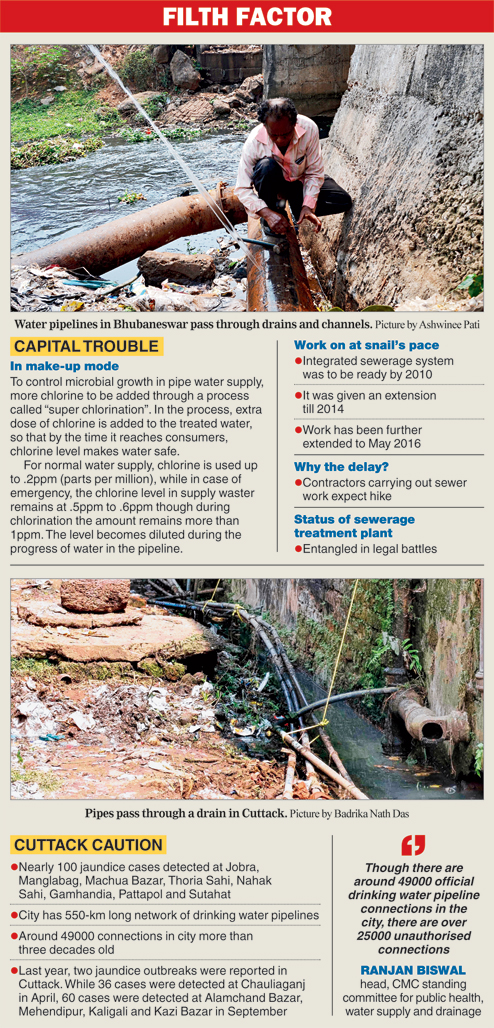Bhubaneswar, Feb. 13: The delay in execution of the integrated sewerage system in the city has put a question mark on residents' safety with jaundice spreading its tentacles in nearby Cuttack.
Sewerage integration separates the sewerage water from drain water. While drains carry rainwater, sewers carry wastewater from houses.
But, while the440-km long old sewerage system barely covers half the city, the new system has failed to make much progress since its launch in 2008. As jaundice is a water-borne disease, contamination of drain water can also infect pipe water.
According to the new project, to be executed under the Odisha Water Supply and Sewerage Board, the integrated system has to add 412km new sewer lines in areas that have none at all. Integration of old and new sewerage systems through six sewerage districts is significant. Each of these will have an independent sewerage treatment plant to treat the effluents.
Environmentalist Bijay Mishra said: "No one knows what is the status of the sewerage treatment plants. If these are not ready, there is no point in having the system."

The board's project engineer B.C. Tripathy said: "So far, we have laid 145-km long sewerage lines in the city. The work was a little slow as the contractor was expecting a hike in his rates. With the government permitting the hike, the work will progress easily."
However, he said that even if some of the pipelines had been laid across the city, no progress had been made on the construction of the plants. "Though tendering process has started, it is now entangled in legal battles causing a stalemate," he said.
Sources said the integrated sewerage system was planned in a manner that each plant could work independently, but if the sewerage lines were ready, delay in commissioning them would further delay its effectiveness.
In another development, household connections taken from the supply line of the public health engineering organisation have come under the scanner of the authorities.
"We have come across such cases. But, civic authorities should take action against the violators as we do not have execution power or enforcement mechanism," said the organisation's superintending engineer Chitta Ranjan Jena.
City health officer Chandrika Prasad Das said: "The illegal connections from the public water supply line will be detected, and if pipes are found to be leaking or passing near drains, notices will be issued to the households. Illegal release of waste water into roadside drains will also be stopped."
Capital Hospital director B.B. Patnaik said: "Yesterday, there were two patients, and today, one patient was received from Khurda. They were admitted for suspected jaundice. All the three cases are from Khurda but so far the disease has not spread in Bhubaneswar."











